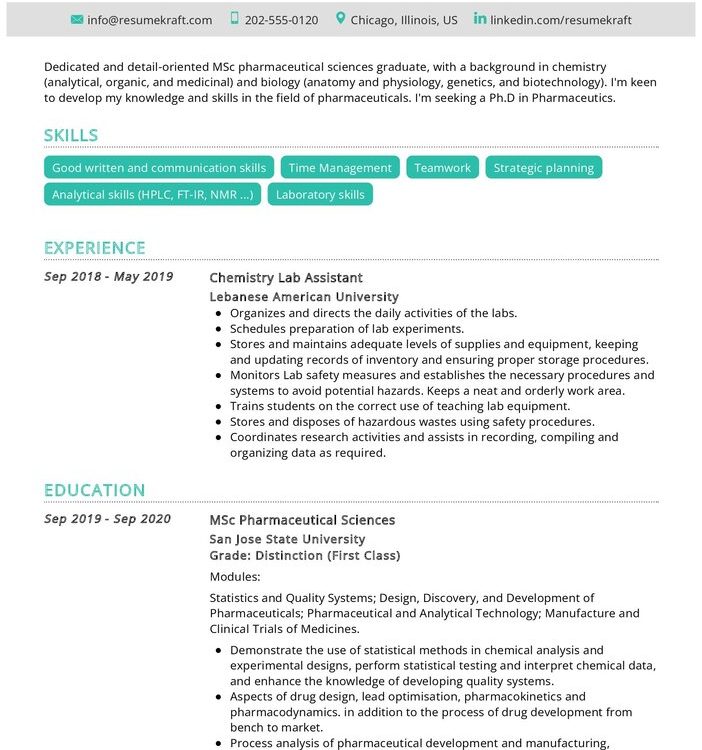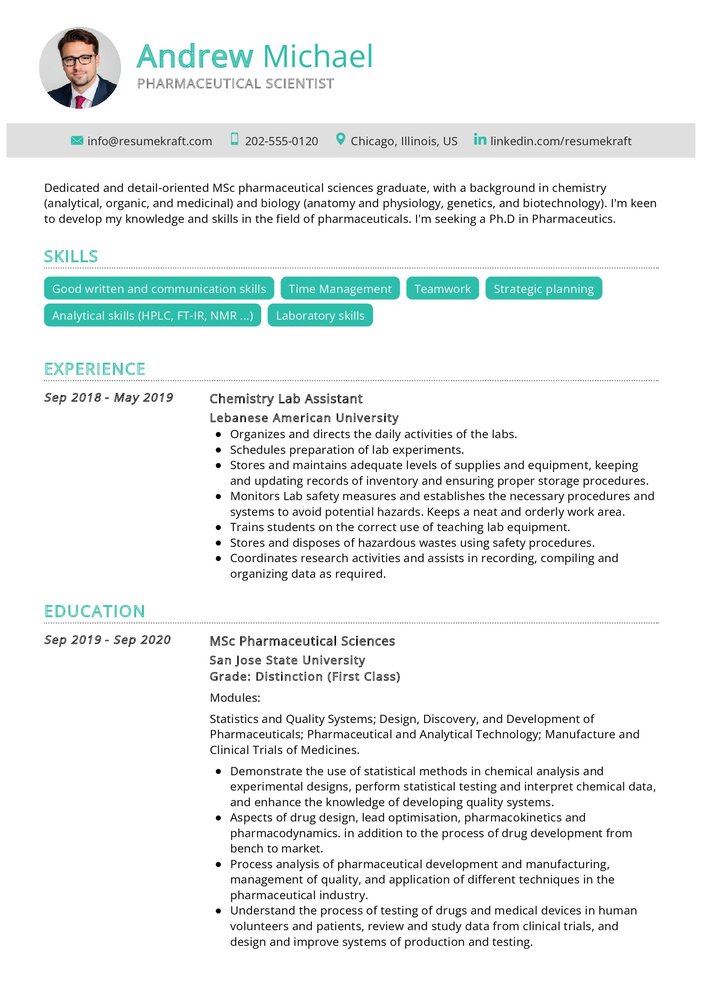What is the Role of a Pharmaceutical Scientist?
Pharmaceutical science is a dynamic field that plays a crucial role in the development, testing, and production of life-saving medications and treatments. A Pharmaceutical Scientist is at the forefront of this intricate process, wielding their expertise to ensure the safety, efficacy, and quality of pharmaceutical products. Let’s delve deeper into the multifaceted role of a Pharmaceutical Scientist, a position that demands a deep understanding of pharmaceutical principles and an unwavering commitment to improving global healthcare.
A Pharmaceutical Scientist is tasked with conducting extensive research and experiments to develop new drugs, refine existing medications, and enhance pharmaceutical formulations. They work in close collaboration with research teams, clinical professionals, and regulatory authorities to ensure that all pharmaceutical products meet stringent safety and efficacy standards. Their role is pivotal in safeguarding public health and advancing the field of medicine through groundbreaking discoveries and innovations.
What are the Pharmaceutical Scientist Job Requirements?
Embarking on a career as a Pharmaceutical Scientist demands a combination of educational qualifications, technical expertise, and a passion for scientific inquiry. Let’s delve deeper into the prerequisites that one needs to fulfill to excel in the role of a Pharmaceutical Scientist:
- A Bachelor’s or Master’s degree in Pharmaceutical Sciences, Chemistry, Biology, or a related field, laying the foundation for comprehensive understanding of pharmaceutical principles.
- Proficiency in laboratory techniques, including chromatography, spectroscopy, and other analytical methods used in drug development and testing.
- Experience in pharmaceutical research and development, demonstrating a track record of contributing to the discovery and refinement of medications.
- Strong analytical and problem-solving skills, essential for interpreting complex data and identifying potential solutions in the pharmaceutical development process.
- Familiarity with regulatory guidelines and compliance standards, ensuring that all pharmaceutical products adhere to industry regulations and safety protocols.
- Excellent communication skills, enabling effective collaboration with cross-functional teams and the dissemination of research findings in the scientific community.
Securing additional certifications in Pharmaceutical Sciences can enhance your profile and showcase your commitment to staying abreast of the latest advancements in the field.
What are the Responsibilities of a Pharmaceutical Scientist?
The role of a Pharmaceutical Scientist encompasses a diverse range of responsibilities, each contributing to the intricate process of drug development and ensuring the safety and efficacy of pharmaceutical products. Let’s unravel the core responsibilities that define this role, each task serving as a crucial puzzle piece in the larger picture of advancing global healthcare:
- Conducting research and experiments to develop new medications, working towards addressing unmet medical needs and improving patient outcomes.
- Collaborating with research teams to conduct preclinical and clinical trials, assessing the safety and efficacy of new drug formulations.
- Analyzing data and research findings, interpreting complex results to identify potential drug candidates and optimize pharmaceutical formulations.
- Ensuring compliance with regulatory standards and guidelines, guiding the development process to meet all necessary safety and efficacy benchmarks.
- Contributing to the publication of research findings in scientific journals and presenting at conferences, sharing valuable insights and discoveries with the global scientific community.
- Monitoring and evaluating the long-term effects of pharmaceutical products, contributing to post-marketing surveillance and ensuring ongoing product safety.
- Staying updated with the latest advancements in pharmaceutical technology and research methodologies, integrating new knowledge into the drug development process.
Each responsibility involves meticulous attention to detail and a dedication to advancing pharmaceutical research and development.
Pharmaceutical Scientist CV Writing Tips
As you embark on the journey to craft a CV that highlights your expertise and contributions in the field of pharmaceutical science, it’s essential to showcase your unique skills and experiences effectively. Here are some tips to help you create a compelling CV:
- Highlight your research projects and contributions to drug development, emphasizing the impact of your work on the pharmaceutical industry.
- Detail your experience in conducting clinical trials and research studies, showcasing your ability to navigate complex scientific processes.
- Include metrics or data to quantify your achievements, providing tangible evidence of your contributions to the field.
- List any relevant certifications or specialized training, demonstrating your commitment to continuous learning and professional development.
- Customize your CV for specific job applications, tailoring your qualifications and experiences to align with the requirements of the role.
Each tip serves as a guide to help you create a CV that effectively communicates your expertise and contributions as a Pharmaceutical Scientist.
Pharmaceutical Scientist CV Summary Examples
Your CV summary serves as an introduction to your professional journey, providing a snapshot of your experiences, skills, and achievements in the field of pharmaceutical science. Here are some examples to inspire you:
- “Dedicated Pharmaceutical Scientist with a strong background in drug development, contributing to the discovery and optimization of life-saving medications for diverse patient populations.”
- “Experienced Pharmaceutical Scientist skilled in conducting clinical trials and research studies, passionate about advancing pharmaceutical research and improving global healthcare outcomes.”
- “Innovative Pharmaceutical Scientist with a proven track record of successful drug formulations, committed to adhering to stringent regulatory standards while pioneering advancements in pharmaceutical technology.”
Each summary provides a glimpse of your professional journey, your expertise, and your commitment to advancing pharmaceutical research and development.
Create a Strong Experience Section for Your Pharmaceutical Scientist CV
Your experience section serves as a testament to your contributions and achievements in the field of pharmaceutical science. It is a space where you can showcase the impact of your work and your dedication to advancing global healthcare. Here are some examples to guide you:
- “Led research teams in the development of a breakthrough cancer medication, contributing to a 30% improvement in patient survival rates and quality of life.”
- “Conducted extensive preclinical trials for a novel cardiovascular medication, resulting in its successful approval by regulatory authorities and subsequent global distribution.”
- “Published research findings in reputable scientific journals, highlighting the efficacy of a newly developed anti-inflammatory drug and its potential impact on chronic disease management.”
Each experience highlights your role in groundbreaking pharmaceutical advancements and your dedication to improving global healthcare outcomes.
Sample Education Section for Your Pharmaceutical Scientist CV
Your educational background serves as a testament to your foundational knowledge and expertise in the field of pharmaceutical science. Here’s how you can list your educational milestones:
- Master of Science in Pharmaceutical Sciences, XYZ University, an immersive program that equipped you with advanced research skills and specialized knowledge, 2018.
- Bachelor of Science in Chemistry, ABC University, the foundation of your understanding of chemical principles and their application in pharmaceutical research, 2014.
- Certified Clinical Research Professional (CCRP), a recognition of your expertise in conducting ethical and quality clinical trials, 2019.
Each educational qualification is a testament to your dedication to mastering the intricacies of pharmaceutical science and advancing your career in the field.
Pharmaceutical Scientist Skills for Your CV
Your skill set serves as a comprehensive toolkit, showcasing your ability to navigate complex scientific processes and contribute to the advancement of pharmaceutical research and development. Let’s list down the essential skills that a Pharmaceutical Scientist should possess:
Soft Skills:
- Research and analytical skills, enabling you to conduct comprehensive studies and interpret complex data.
- Attention to detail, ensuring accuracy and precision in all stages of pharmaceutical research and development.
- Collaboration and teamwork, facilitating effective communication and coordination with cross-functional research teams.
- Critical thinking and problem-solving abilities, guiding you in identifying solutions to complex challenges in drug development and testing.
- Effective communication, enabling you to convey complex scientific concepts to diverse audiences, including fellow researchers, clinicians, and regulatory authorities.
Hard Skills:
- Proficiency in laboratory techniques, including chromatography, spectroscopy, and other analytical methods used in drug development and testing.
- Knowledge of pharmaceutical regulations, ensuring compliance with industry standards and guidelines in all stages of drug development and production.
- Experience in conducting preclinical and clinical trials, showcasing your ability to oversee comprehensive studies to assess the safety and efficacy of pharmaceutical products.
- Expertise in drug formulation and development, enabling you to contribute to the creation of effective and safe medications for diverse medical conditions.
- Data analysis and interpretation skills, facilitating the assessment of research findings and the identification of potential drug candidates for further development and testing.
Each skill is a testament to your comprehensive understanding of pharmaceutical science and your ability to contribute to the advancement of global healthcare.
Most Common Mistakes to Avoid When Writing a Pharmaceutical Scientist CV
As you craft your CV, it is essential to avoid common pitfalls that can detract from your qualifications and expertise in the field of pharmaceutical science. Here we list down the mistakes often seen in CVs and how to avoid them:
- Using generic language and descriptions that fail to highlight your unique contributions and expertise in pharmaceutical research and development.
- Overlooking the importance of detailing your specific role and impact in research projects, resulting in a lack of clarity about your individual contributions.
- Omitting relevant certifications or specialized training that showcase your commitment to professional development and staying updated with the latest advancements in the field.
- Neglecting to tailor your CV for specific job applications, resulting in a lack of alignment between your qualifications and the requirements of the role.
- Failing to proofread your CV thoroughly, leading to grammatical errors or inconsistencies that can detract from your professional image and attention to detail.
Each mistake has the potential to diminish the impact of your CV, so it is crucial to be mindful and meticulous in presenting your qualifications and experiences effectively.
Key Takeaways for Your Pharmaceutical Scientist CV
As we reach the end of this comprehensive guide, let’s recap the key points to keep in mind while crafting your Pharmaceutical Scientist CV:
- Emphasize your contributions to drug development and pharmaceutical research, highlighting the impact of your work on advancing global healthcare outcomes.
- Showcase your proficiency in laboratory techniques and data analysis, demonstrating your ability to navigate complex scientific processes and contribute to groundbreaking discoveries in the field.
- Detail your experience in conducting preclinical and clinical trials, emphasizing your role in assessing the safety and efficacy of pharmaceutical products.
- Include a section on professional development and certifications, showcasing your commitment to staying updated with the latest advancements in pharmaceutical science.
Finally, feel free to utilize resources like AI CV Builder, CV Design, CV Samples, CV Examples, CV Skills, CV Help, CV Synonyms, and Job Responsibilities to create a standout application and prepare for the [Pharmaceutical Scientist job interview](Job interview-questions).


